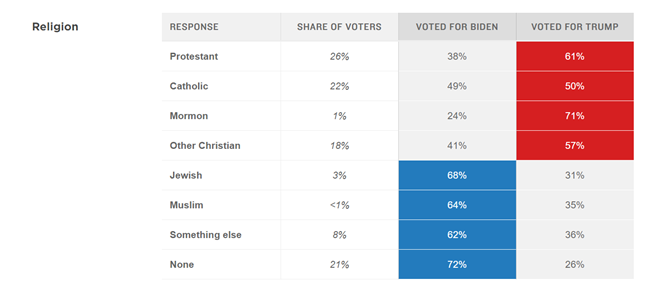Last week, I was tweeting like many people about the US election (specifically what a relief it is to have lawless nationalist populism defeated at the ballot – and not by opposite extremists, but by liberal democratic internationalists).
An immediate snarky tweet in reply came from a fellow tweeter – a Christian – replying yes indeed how wonderful it is to have a Christian in the White House (Joe Biden’s Catholicism is well documented). I suppose that the tweeter meant to imply that I was an unlikely supporter of a religious politician. Nothing could miss the point more!
What I care about is not a politician’s religion, but whether they have the right values, obey the law, and whether, in their politics, they are a secularist. Biden and Harris are both secularists in the American tradition. Yes, Joe Biden is a Roman Catholic. But he is a Roman Catholic who has consistently taken the principled position of not seeking to impose his own values and assumptions, through law, on those who don’t share them.
I think there may also be other reasons for humanists (and secularists of different religions of beliefs) to think this election could mark a turning point for the United States.
Winning an election in the United States has traditionally meant building an electoral coalition which included at least some extremely devout religious adherents, with strong anti-abortion and anti-LGBT views. But political polarisation, aided by partisan news media like FOX News and increasingly incendiary political rhetoric, has united this group almost entirely under the Republican party. Under Trump, Christian nationalists and conservative forces have sought to undermine the separation of state and church in the US.
The rise of the non-religious in America has had profound implications too. Some 80% of non-religious Americans voted Democrat at the last election, making up 40% of the Democratic base. With support from religious progressives and black voters, the Democrats now have a progressive coalition that constitutes a majority of Americans. Where past Democrats had to be careful not to lose the support of religious literalists on issues like same-sex marriage and abortion, Biden’s might feel free to ignore them altogether. This is clear enough from his victory address, which thanked gay, lesbian, bisexual, and transgender Americans for their votes.
Statistics reinforce the notion of a more pluralistic Democratic base. Trump, whose personal conduct some years ago would have repelled many conservative Christians, won among all Christian denominations – Evangelical, and Protestant, and narrowly, Catholic. In contrast, Biden won – and with large margins – the support of the Jewish, Muslim, and non-religious Americans.
Source: NPR
But he won biggest among the non-religious and that’s good news. Although secularism benefits all and has adherents with religious as well as non-religious worldviews, it is undoubtedly more supported by the non-religious and, as a growing demographic in the US, increasing numbers of politicians will need their support.
It’s clear that Biden intends to represent the interests of Americans of all religions or beliefs rather than entrenching a narrow vision of “religious freedom” that elevates one particular religion or belief above others. In less than a week of winning the election, the President Elect indicated his support for reversing the so-called ‘gag rule’; a government policy that blocks U.S. federal funding for non-governmental organisations that are seen to promote or advocate for the decriminalisation of abortion. When asked about his stance on abortion in 2015, he stated that though he personally believes life begins at conception, ‘What I am not prepared to do is impose a precise view that is borne out of my faith on other people.’ As with this, most toxic, of issues in America, so too with the other flashpoint issues of American secularism.
America has always had its own distinct flavour of secularism, born of a constitutional commitment to the freedom of religion and the separation of state institutions from religious ones as a way of achieving that freedom. I believe that Biden will make sure the US lives up to its ideals of being a place where people of all religions and beliefs are welcome, equal, and free to practice their religion or belief as they choose, but not to impose their unshared views on others.
